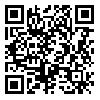Volume 11, Issue 3 (September 2024)
Avicenna J Neuro Psycho Physiology 2024, 11(3): 108-116 |
Back to browse issues page
Ethics code: IR.IAU.B.SDJ.REC.1401.096
Download citation:
BibTeX | RIS | EndNote | Medlars | ProCite | Reference Manager | RefWorks
Send citation to:



BibTeX | RIS | EndNote | Medlars | ProCite | Reference Manager | RefWorks
Send citation to:
Vahid F, Ebrahimi M E, Kord Noghabi R. Comparing the Effectiveness of Acceptance and Commitment Therapy and Reality Therapy on Parent-Child Relationship. Avicenna J Neuro Psycho Physiology 2024; 11 (3) :108-116
URL: http://ajnpp.umsha.ac.ir/article-1-491-en.html
URL: http://ajnpp.umsha.ac.ir/article-1-491-en.html
1- Department of Psychology, Sanandaj Branch, Islamic Azad University, Sanandaj, Iran
2- Department of Psychology, Faculty of Humanities, Hamedan Branch, Islamic Azad University, Hamedan, Iran ,MohammadnEsmaeilebrahimi@iauh.ac.ir
3- Department of Psychology, Faculty of Economic and Social Sciences, Bu-Ali Sina University, Hamadan, Iran
2- Department of Psychology, Faculty of Humanities, Hamedan Branch, Islamic Azad University, Hamedan, Iran ,
3- Department of Psychology, Faculty of Economic and Social Sciences, Bu-Ali Sina University, Hamadan, Iran
Abstract: (2481 Views)
Background and Objective: Adolescence is a unique period of transition that is associated with physical, psychological, and social changes. In addition to these changes, the discovery of identity is also considered one of the most important features of this period. As a result, the need for independence grows, prompting individuals to explore their self-concept and values, which in turn leads to changes within the family that trigger further transformations. In parent-child relationships, this research was conducted with the aim of comparing the effectiveness of acceptance and commitment therapy (ACT) and reality therapy (RT) in a group setting on the parent-child relationship in teenage students.
Materials and Methods: The research method was quasi-experimental with a pretest-posttest design and a control group. The research population included all male secondary school students of the 2nd district of Hamadan city who were studying in the academic year 2022-2023. From these, 3 groups of 20 people each were selected by multi-stage cluster sampling method and randomly divided into experimental and control groups. The samples completed the Parent-Child Relationship Survey by Fine, Moreland, and Scobel (1983) in two pre-post sessions. The participants in the experimental groups underwent treatment using the ACT and RT methods in eight 60-minute sessions each week, while the control group did not receive any training. The data were statistically analyzed in SPSS software (version 23) using the analysis of covariance test at a significant level of p < 0.05.
Results: The findings indicated that the average post-test score for the group undergoing the ACT-based treatment for the father-child relationship was 20.5 points higher than that of the control group (i-j=20.5, sig=0.034). Additionally, the mean post-test score for the group receiving RT for the parent-child relationship surpassed the control group by 42.9 points (i-j=42.9, sig=0.0001).
Conclusion: The results of this study suggest that both ACT and RT contributed to enhancing the father-child relationship.
Materials and Methods: The research method was quasi-experimental with a pretest-posttest design and a control group. The research population included all male secondary school students of the 2nd district of Hamadan city who were studying in the academic year 2022-2023. From these, 3 groups of 20 people each were selected by multi-stage cluster sampling method and randomly divided into experimental and control groups. The samples completed the Parent-Child Relationship Survey by Fine, Moreland, and Scobel (1983) in two pre-post sessions. The participants in the experimental groups underwent treatment using the ACT and RT methods in eight 60-minute sessions each week, while the control group did not receive any training. The data were statistically analyzed in SPSS software (version 23) using the analysis of covariance test at a significant level of p < 0.05.
Results: The findings indicated that the average post-test score for the group undergoing the ACT-based treatment for the father-child relationship was 20.5 points higher than that of the control group (i-j=20.5, sig=0.034). Additionally, the mean post-test score for the group receiving RT for the parent-child relationship surpassed the control group by 42.9 points (i-j=42.9, sig=0.0001).
Conclusion: The results of this study suggest that both ACT and RT contributed to enhancing the father-child relationship.
Article Type: Research Article |
Subject:
Clinical Psychology
Received: 2024/07/13 | Accepted: 2024/10/17 | Published: 2025/02/24
Received: 2024/07/13 | Accepted: 2024/10/17 | Published: 2025/02/24
Send email to the article author
| Rights and permissions | |
 |
This work is licensed under a Creative Commons Attribution-NonCommercial 4.0 International License. |







